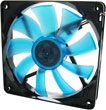Wing 12 UV Blue 120mm High Performance Case Fan Discontinued | |
| More variations available Show | |
Gelid Solutions Wing 12 UV Blue 120mm High Performance Case Fan
The WING UV Blue case cooling fans are premium quality, UV reactive, ultra-quiet, dust and waterproof for gaming enthusiasts. This series features a unique bearing with patented design, winglet fans blades and low starting voltage. Only the highest quality materials have been used to manufacture this state-of-the-art cooling fan. To add to the silence, fan mounts replace traditional screws and are made of high quality, ultra-soft silicone which stop vibrations from the fan motor from travelling into your PC case.
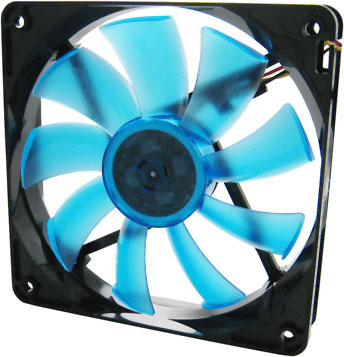
Features
- Nanoflux Bearing (NFB)
- Optimised Winglet Fan Blades
- Waterproof and Dustproof
- Long Lifetime 100,000 hours
- Rubber Fan Mounts
- Resistor cable to lower fan speed
Nanoflux Bearing (NFB)
Patented Nanoflux bearing incorporates a clever magnetic design, very high precision manufacturing and runs friction-free and operates noiseless. Electromagnetic fields are exploited to keep solid parts from touching. The load is carried by a magnetic field.
Key Features of Nanoflux Bearing (NFB)
The Nano-technology composite ensures lowest abrasion and extreme durability (MTTF 100,000 hours). Compared to other Magnetic bearings this technology allows the impeller to be detached and thus the fan blades can be cleaned easily.
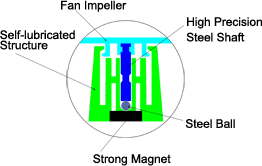
The material of the Nanoflux bearing is self lubricating and even waterproof

The fan impeller can be removed from the black fan case by applying gentle pressure
Nanoflux Bearing (NFB) compared to sleeve and ball bearings
Even though conventional sleeve and ball bearings currently dominate the fan market, both have their disadvantages. While sleeve bearings have very low noise emissions and are very cost effective, they tend to leak oil; once the oil has dissipated the fan can no longer operate. Ball bearings, on the other hand, while providing longer operating life are costlier, noisier and are prone to damage. Gelid’s Nanoflux bearing uses magnetic flux to limit contact and friction between the bearing and the shaft. High precision self-lubricated material eliminates oil leakage. The result is a ultra quiet long life bearing.
Rubber Fan Mounts
Vibration from fan motors can travel into a PC case and become amplified when a fan is fitted tightly. This vibrational noise is annoying if you wish to build a very quiet or virtually silent PC. These rubber mounts have been designed specifically to deal with fan-induced vibrations and are an ideal alternative to standard fan screws, leaving vibrations 100% decoupled from your PC case.
| Specifications | Wing 12 Fan |
|---|---|
| Air Flow (CFM) | 64.3 |
| Bearing | Nanoflux Bearing (NFB) |
| Cable Length (mm) | 500 |
| Connector | 3-Pin |
| Current (A) | 0.22 |
| Dimensions (mm) | 120 x 120 x 25 |
| Fan Speed (RPM) | 1500 |
| Noise Level (dBA) | 12 - 25 |
| Safety Approvals | UL, CUL, CE, RoHS Compliant |
| Static Pressure (mmAq) | 1.93 |
| Start Voltage (V) | 12 |
| Accessories | Four rubber fan mounts, Resistor cable |
| Weight (g) | 119 |
| Warranty | 60 months |
| EAN barcode | 4897025780651 |
| Specifications | Wing 12 Fan |
|---|---|
| Air Flow (CFM) | 64.3 |
| Bearing | Nanoflux Bearing (NFB) |
| Cable Length (mm) | 500 |
| Connector | 3-Pin |
| Current (A) | 0.22 |
| Dimensions (mm) | 120 x 120 x 25 |
| Fan Speed (RPM) | 1500 |
| Noise Level (dBA) | 12 - 25 |
| Safety Approvals | UL, CUL, CE, RoHS Compliant |
| Static Pressure (mmAq) | 1.93 |
| Start Voltage (V) | 12 |
| Accessories | Four rubber fan mounts, Resistor cable |
| Weight (g) | 119 |
| Warranty | 60 months |
| EAN barcode | 4897025780651 |
See Also
Product Resources
FAQ
How do I measure fan size?
The size of fan you need will generally be determined by the size of the fan fitting position in your PC case. The sizes of all the fans on our website are shown as measured along any one of the fan’s four sides, NOT the distance between the fan’s screw holes! Our most popular fan size is 120mm, followed by 80mm. This isn’t really dictated by customer preference, but more by recent designs of PC cases.
As for the thickness (depth) of the fan, generally 25mm (1 inch) is by far the most common depth, although smaller fans can have shallower depths such as 15mm or even 10mm. All our fans are 25mm thick unless otherwise stated. If you have any questions about which fan you should order, please don’t hesitate to get in touch.
If you know the distance between the fan mounting screw holes but don’t know what fan size to order, please see the following table. Note that the mounting hole measurements shown below are taken horizontally or vertically between the holes and not diagonally.
Screw hole spacings and fan sizes
Space Between Screw Holes Fan Size 32mm 40mm 40mm 50mm 50mm 60mm 60mm 70mm 72mm 80mm 83mm 92mm 105mm 120mm I received a small cable (resistor) with my fan; what is it for?
The resistor cable (also called Ultra Low Noise or ULN cable) is designed to allow the fan to run slightly slower for even quieter operation. The benefit in lower running noise is significant. Although the airflow will be reduced slightly, this usually has minimal effect on PC temperature. We would generally recommend using the ULN resistor cable for best results in almost all circumstances.
How can I tell which way the air blows through the fan?
Hold the fan so that the round fan sticker is facing you. You are looking at the rear of the fan. When you plug the fan in, the air will be blowing towards you. If you want a fan to act as an air intake, then the fan sticker will be facing the inside of the case. Some fans also have two small arrows moulded into their plastic housing - one arrow shows the direction of airflow, and the other (at 90°) shows the direction of blade rotation.
Is it possible to use a 4-pin PWM fan or CPU cooler with a motherboard which has only 3-pin fan headers on it?
Electrically, there is no problem doing this - the fourth pin on the fan cable is used purely for PWM control and is not needed in order for the fan to run. So you can plug the 4-pin fan connector onto the 3-pin motherboard fan header, leaving the fourth pin not connected to anything. The fan will potentially run at full speed, so if you would like to reduce the speed of the fan you will need to adjust the fan speed setting in your BIOS or use fan control software such as SpeedFan in Windows.
The only other problem to consider is that occasionally, components immediately adjacent to the motherboard fan header can get in the way of the larger 4-pin fan connector, physically preventing connection. This problem also occurs if you try to use an in-line fan speed controller such as the one made by Gelid.
Another avenue to explore is the possibility of using a bay-mounted fan controller. Several models are available now which provide 4-pin fan headers, so this is an easy way to use 4-pin PWM fans in a PC system which has only 3-pin fan headers on its motherboards. When using this method, you may find it necessary to disable any fan warning settings in your motherboard BIOS, since the motherboard may incorrectly believe that its CPU fan has failed when the fan is connected to a fan controller rather than directly to the motherboard itself.
Top Quiet Fans

Noctua NF-A20 PWM 5V 800RPM 200x30mm Extra Large Quiet Fan

Noctua NF-A12x25 PWM chromax.black.swap 12V 2000RPM 120mm Fan

Noctua NF-S12B REDUX 12V 700RPM 120mm Quiet Case Fan

Noctua NF-A6x25 PWM 12V 3000RPM 60x25mm Low Noise Fan
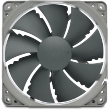
Noctua NF-P12 REDUX PWM 12V 1700RPM 120mm Quiet Case Fan
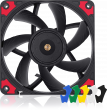
Noctua NF-A12x15 PWM chromax.black.swap 12V 1850RPM 120x15mm Fan

Noctua NF-A14 PWM chromax.black.swap 12V 1500RPM 140mm Fan

Noctua NF-F12 iPPC PWM 12V 3000RPM 120mm High Performance Fan

Noctua NF-A14 PWM 12V 1500RPM 140mm Premium Quality Fan
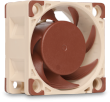
Noctua NF-A4x20 PWM 12V 5000RPM 40x20mm Quiet Cooling Fan

